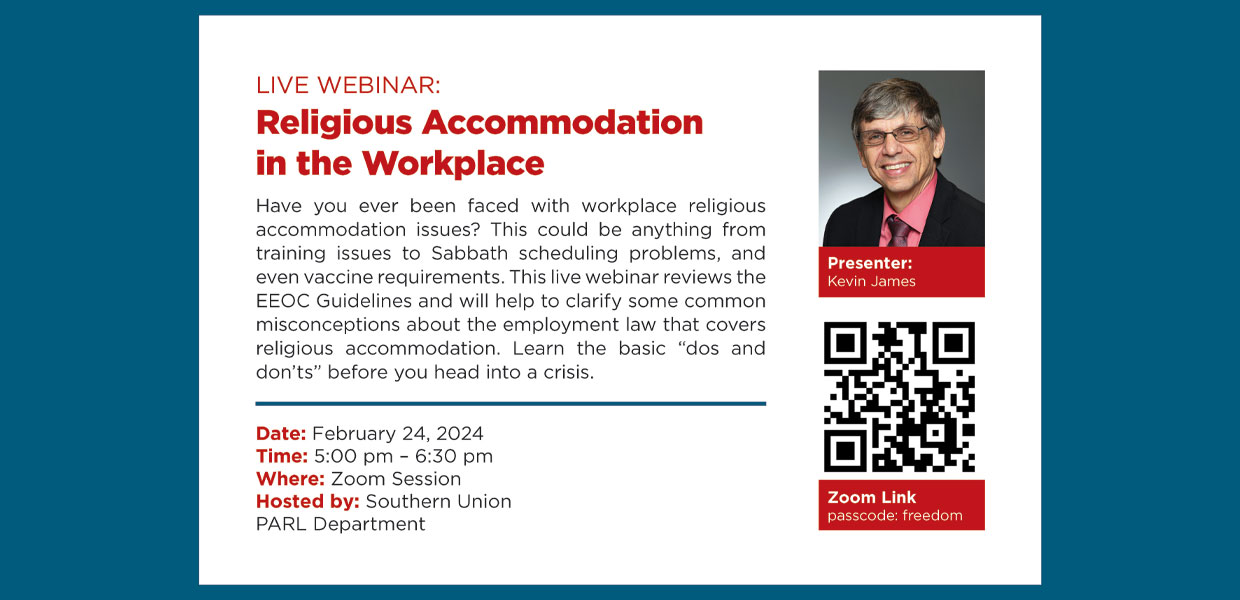

Workplace religious accommodation received a hopeful boost this past summer from the U.S. Supreme Court’s ruling in Groff vs. DeJoy, a case in which the Seventh-day Adventist Church played a significant role to maintain religious liberties.
Gerald Groff, a Sunday-keeping Christian, started working for the United States Postal Service (USPS) in 2012 as a rural mail carrier. Shortly after that, Amazon contracted with the USPS to deliver packages seven days a week, and the post office where Groff worked quickly became an Amazon package hub for the area. After informing the USPS that he needed to be off on Sunday for religious observance, the agency eventually moved him to a smaller facility to accommodate his request for time off.
Unfortunately, even though the USPS worked the problem out and accommodated Groff for a few years, this accommodation did not stand the test of time. Changing contractual issues with the labor union began to present themselves — even in the smaller postal facility he had been assigned to for his accommodation. By 2017, Groff was facing problems again with Sunday package deliveries, this time because the labor union that he was under had established an MOU (memorandum of understanding) with the post office on the ways a carrier could get Sunday off. There were only two ways to get Sunday off, and religious accommodation was not part of those exceptions.
By 2019, Groff had undergone so much “progressive discipline” that he decided he had no other choice but to resign. In the complaint brought to the court, Groff contends that he could have been accommodated without “undue hardship on the conduct of the business.” These are key words every Adventist will face when confronted with a religious accommodation problem. The term “undue hardship” can be frustrating to deal with simply because the term has been very broadly defined since its inception into the world of workplace accommodation. For the last 50 years, the Public Affairs and Religious Liberty (PARL) Department throughout the North American Division has advocated for better definitions of workplace accommodation rules, losing to big business and pro-business courts in favor of employers who have a very low threshold when meeting definitions like “undue hardship.” Groff’s case, just like many of the cases we work on for Church members, was decided by a lower court that found the USPS had met the very low threshold of “undue hardship” when another employee complained about the accommodation stating that it conflicted with his contractual rights. The absurd ease with which an employer can meet the “undue hardship” standard might mean that your right to get Sabbath off is dependent on the goodwill of yourfellow workers rather than the goodwill of your employer in some cases. Although, to be fair, the EEOC Guidelines on accommodation specifically mention this scenario is not a reason to reject a reasonable accommodation to those in need of such.
The Supreme Court’s concern in this case took up the issue of a clearer definition of what “undue hardship” means for employers who have been asked to accommodate a religious belief. The court was concerned that the hardship should factor in more than “de minimis cost” (the minimal or least amount of cost). In other words, employers cannot use the excuse that they have incurred an “undue hardship” by having to incur “the least amount of cost” to the company in making an accommodation. The court believes the expectation should be that the company would incur a “significant cost,” thus actually creating true hardship on the operations of the company.
Despite these hopeful new standards the court has directed employers to implement, Groff’s case has not been
resolved. The Supreme Court returned it to the lower courts to make a determination based on its decision regarding the terminology used in defining what constituted a hardship.
It is important to know the role the Adventist Church played in this case and in countless others about which you will never even know. The Church’s amicus brief (a report of expertise or insight offered by a party not directly involved) in this case was one of the first cited in the court’s opinion. We believe our brief was impactful on this case.
From our earliest days as a Church, we have sought peaceful ways to strengthen and defend religious liberty — from our earliest success in 1864, when we appealed to the governor of Michigan to be recognized as opposing the bearing of arms, to our defense and hard work in the 1970s and 1980s in getting legislation passed to protect Church members’ jobs when faced with opposition to labor union membership, and even in the quiet but diligent way we helped hundreds of members opposed to vaccines for their personal religious beliefs. Our record has stood long and strong. And, while we may not be the biggest name out there defending religious freedom today, we are one of the oldest and most consistent organizations doing such work.
As Seventh-day Adventist members, you should be proud to join in this effort. You and I, and many others, are partners in this work. This is not because we seek fame or fortune, for those things will fade away when Jesus returns. We are partners together in this cause because we value religious freedom as a precious gift from God.
ELECTION YEAR PROHIBITION ON POLITICAL CAMPAIGNS WITHIN CHURCHES
The year 2024 finds us in a presidential election cycle. Now is the perfect time to remind you that it is every member’s duty to be cautious and protect the Church’s tax-exempt status. The Seventh-day Adventist Church in North America has intentionally decided that our churches exist for the spiritual and not the political. We urge churches to continue to obey these rules.
• Under IRS code all 501(c)(3) organizations (churches) are prohibited in a very strict manner from participating either directly or indirectly with any political campaign on behalf of any candidate or elected public official. This includes any official running in local, state, or federal elections.
• Prohibition goes beyond candidate endorsement by the organization. Prohibition includes contributions to campaign funds, as well as public statements of position, either written or verbal.
• Allowing a candidate to use the Church’s assets or property (facilities) is prohibited.
• Church leaders cannot make partisan statements in publications (including websites or social media connected with the local church office) or at functions.
• In an election year, always check the IRS rules for specific issues involving candidate appearances in your church for any reason. The IRS rules detail what is permissible and prohibited.
This is not an exhaustive list of prohibitions. The Adventist Church only has one tax exemption. We all share it; each local church, pastor, and member is connected. It is important to remember that when you violate any one of these rules, you risk jeopardizing the Adventist Church’s tax-exempt status. If you have questions, you can always contact the Public Affairs and Religious
Liberty Department or check the IRS website at www.irs.gov.
THE BEST ADVICE:
Concentrate on the spiritual realm rather than the political realm when at church.
is the public affairs and religious liberty director for the Southern Union Conference.
Southern Union | January 2024



Comments are closed.